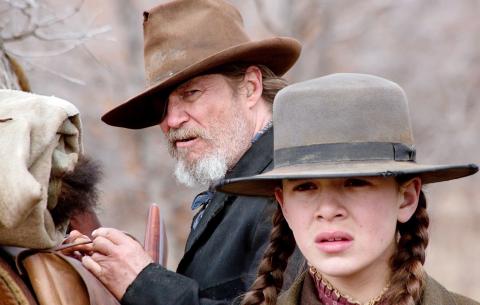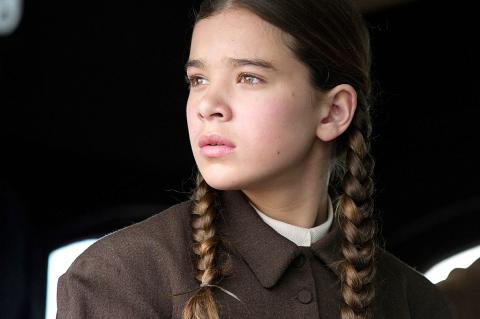That old-time American religion of vengeance runs like a river through True Grit, a comic-serious tale about some nasty, brutish times. Beautifully adapted by Joel and Ethan Coen from the parodic western novel by Charles Portis, it turns on a 14-year-old Arkansas girl who hires a “one-eyed fat man” to hunt down her father’s killer. First published in 1968, Portis’ tall tale was brought to the screen the next year custom-fitted for John Wayne, who rode the role of that fat man, Rooster Cogburn, straight to an Oscar. Now it’s the thinner scene-stealer Jeff Bridges who sits and sometimes drunkenly slumps in the saddle.
Much as he did in the raucously entertaining original film directed by Henry Hathaway, Rooster enters on his best behavior, seated in a courtroom amid a fog of cigar smoke and conspicuous lies. The pale, ghostly light comes courtesy of the Coens’ frequent cinematographer, Roger Deakins, while many of the twisty, funny sentences have been plucked by the filmmakers right from the novel. A deputy US marshal, Rooster has attracted the interest of Mattie Ross (Hailee Steinfeld, in a terrific film debut), a half-pint who, with her bloodlust and severely braided hair, is an authentic American Gothic. As she listens to Rooster recount his bloody deeds and high body count, her eyes shine with a true believer’s excitement.
Avenging her father and keeping close track of her family’s expenses are what preoccupy Mattie, a richly conceived and written eccentric, as memorable on the page as she is now on screen. Softened for the first film (in which she was played by a 21-year-old Kim Darby, in a bob), she has been toughed up again by the Coens so that she resembles the seemingly humorless if often unintentionally humorous scripture-quoting martinet of Portis’ imagination. At times she brings to mind D. H. Lawrence’s famed formulation that “the essential American soul is hard, isolate, stoic and a killer.” At other times, as when she wears her dead father’s oversize coat and hat, she looks like a foolish child left to perilous play.

Photo courtesy of UIP
Those dangers are telegraphed early by the public hanging that occurs soon after the story opens. Mattie, along with a family worker, Yarnell (Roy Lee Jones), has traveled from her Yell County home to Fort Smith, Arkansas, to identify her father, who has been gunned down by another worker, Tom Chaney (Josh Brolin). After doing so, she sends Yarnell home and gets down to business, first by settling her father’s accounts. She then hires Rooster because she hears that he has “true grit,” a quality that mostly seems to entail a disregard for preserving the lives of his prisoners. It’s no wonder she watches the hanging with such avidity, and no wonder too that she takes off after Chaney, armed with Rooster and her father’s heavy gun.
Their journey leads them into Indian country (with few Indians) and increasingly tense and violent encounters featuring corpses, severed fingers and a bad, bad man (Barry Pepper, spewing fear and spittle). On occasion a Texas Ranger, LaBoeuf (Matt Damon), who calls himself LaBeef, joins in the search. Wearing jangling spurs and a luxurious mustache that sits on his lip like a spoiled Persian cat, LaBoeuf hopes to bag Chaney for a large reward. Dead or alive, everyone in this story — snaggletooth thief or boardinghouse owner — has a price either on his head or in mind, usually in the form of the dollars and cents one person hopes to extract from another. “Why do you think I am paying you,” Mattie asks Rooster, “if not to have my way?”
The Coens deliver that line with a touch so light you might not even notice its sting. They have been surprisingly faithful to the tone and idiomatic tang of Portis’ novel, perhaps because its worldview suits their ironic purposes. The whiskey-soaked Rooster still likes to “pull a cork,” as he does in the book, and the Coens and Bridges get into the boozy spirit of things with slurs and pratfalls.

Photo courtesy of UIP
Despite Bridges’ showy turn, the movie opens and closes with Mattie’s voice-over, which shifts the story away from Rooster and back to her. The Coens also restore the novel’s framing device: True Grit isn’t just the story of a gutsy 14-year-old; it is her story as called from the memory of the woman (Elizabeth Marvel) she became.
The Coens opened their last film, A Serious Man, about a 1960s Minneapolis professor who endures trials worthy of Job, with an enigmatic short story about a 19th-century tale involving a possible dybbuk. That story is prefaced with a quotation attributed to the medieval Jewish scholar Rashi (“Receive with simplicity everything that happens to you”) that appears in a 19th-century comic story, The Gilgul, or The Wandering Soul, about a dybbuk, or restless spirit, that inhabits a person. In True Grit the Coens switch to Solomon, opening the film with the first half of Proverbs 28:1 (“The wicked flee when none pursueth”), a line Mattie quotes early in the novel. Like Portis, they notably omit the second line: “But the righteous are bold as a lion.”
Portis’ book hit in 1968, in the midst of a pop-cultural cycle that, partly fueled by the Vietnam war, was revisiting the cowboy myth with degrees of cynicism and nostalgia. True Grit sticks to the western template, but with characters who, at least initially, fall far short of the heroic ideal of the type that Wayne himself embodied for decades. Yet no matter how roguish (and laughable) in the novel, Rooster can’t help registering as a larger-than-life hero on screen because the legend who played him, by then a survivor of cancer and countercultural assaults (for the jingoistic Green Berets), had played his role for so long. When Wayne won best actor for True Grit, it was for playing John Wayne.
The first True Grit opened in New York in early July 1969, a week after The Wild Bunch, the Sam Peckinpah western that’s widely seen as a metaphor about interventionist follies like Vietnam and that remains an enduring evisceration of the genre. The Coens, who like to play with genre, often with giggles and winks, haven’t mounted an assault on the western. But in Mattie they have created a character whose single-minded pursuit of vengeance has unmistakable resonance. In the first True Grit, when Rooster watches Mattie cross a river on horseback, he jocularly says, “She reminds me of me.” The line isn’t in the remake, but from the long, hard look Rooster gives her now, it’s clear that she still does, for better and worse.
In classic Coen style, the brothers punctuate the image of Mattie riding to dry ground with a cutaway to a slack-jawed Rooster, his mouth agape in wonder. By the time the scene ends, the mood has switched again, and Rooster has drawn his gun on LaBoeuf in deadly seriousness. (Damon plays the designated clown with grace, as Bridges slides between buffoonery and malice.)
In some ways, much like Charles Laughton’s Night of the Hunter, which the Coens quote both musically and visually, True Grit is a parable about good and evil. Only here, the lines between the two are so blurred as to be indistinguishable, making this a true picture of how the West was won, or — depending on your view — lost.

May 18 to May 24 Pastor Yang Hsu’s (楊煦) congregation was shocked upon seeing the land he chose to build his orphanage. It was surrounded by mountains on three sides, and the only way to access it was to cross a river by foot. The soil was poor due to runoff, and large rocks strewn across the plot prevented much from growing. In addition, there was no running water or electricity. But it was all Yang could afford. He and his Indigenous Atayal wife Lin Feng-ying (林鳳英) had already been caring for 24 orphans in their home, and they were in

On May 2, Chinese Nationalist Party (KMT) Chairman Eric Chu (朱立倫), at a meeting in support of Taipei city councilors at party headquarters, compared President William Lai (賴清德) to Hitler. Chu claimed that unlike any other democracy worldwide in history, no other leader was rooting out opposing parties like Lai and the Democratic Progressive Party (DPP). That his statements are wildly inaccurate was not the point. It was a rallying cry, not a history lesson. This was intentional to provoke the international diplomatic community into a response, which was promptly provided. Both the German and Israeli offices issued statements on Facebook

Even by the standards of Ukraine’s International Legion, which comprises volunteers from over 55 countries, Han has an unusual backstory. Born in Taichung, he grew up in Costa Rica — then one of Taiwan’s diplomatic allies — where a relative worked for the embassy. After attending an American international high school in San Jose, Costa Rica’s capital, Han — who prefers to use only his given name for OPSEC (operations security) reasons — moved to the US in his teens. He attended Penn State University before returning to Taiwan to work in the semiconductor industry in Kaohsiung, where he

Australia’s ABC last week published a piece on the recall campaign. The article emphasized the divisions in Taiwanese society and blamed the recall for worsening them. It quotes a supporter of the Taiwan People’s Party (TPP) as saying “I’m 43 years old, born and raised here, and I’ve never seen the country this divided in my entire life.” Apparently, as an adult, she slept through the post-election violence in 2000 and 2004 by the Chinese Nationalist Party (KMT), the veiled coup threats by the military when Chen Shui-bian (陳水扁) became president, the 2006 Red Shirt protests against him ginned up by